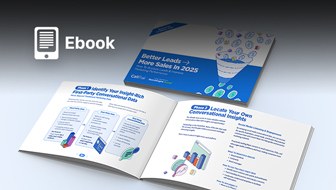This post was sponsored by That PPC Guy. The opinions expressed in this article are the sponsor’s own.
Google Ads campaigns not yielding the desired results?
Want to turn things around, but don’t quite know where to start?
Unsure of where your PPC campaign may have gone wrong?
In This Guide:
- 1. How To Improve Google Ads Audience Targeting
- 2. How To Improve Future Conversions With Conversion Tracking
- 3. How To Focus On Keyword Relevance & Targeting
- 4. How To Manage Your Negative Keyword Lists
- 5. How To Integrate Your Google Business Profile
- 6. Start Auditing & Optimizing Your Campaigns With That PPC Guy
Google Ads can be a powerful tool to drive traffic, generate leads, and increase sales.
However, managing your campaigns successfully can be a complicated task – especially as a small business owner competing for search visibility against the big spenders.
Between proper audience targeting, conversion tracking, and keyword optimization, there’s a lot that goes into making a Google Ads campaign effective.
So, if you’re going to invest your precious time and money, you might as well get the results you deserve.
With that said, let’s explore how you can:
- Audit your campaigns to eliminate wasted ad spend.
- Make efficient, relevant ads for the right audience.
First, what should you avoid when creating Google Ads?
5 Common Causes For Underperforming Google Ads
Some of the most common issues encountered by small businesses using Google Ads are:
- Missing or incorrect audience targeting.
- Lack of proper conversion tracking setup.
- Irrelevant or poorly targeted search terms/keywords.
- Failure to establish negative keywords.
- No connection to Google Business pages.
So, let’s dive into how you can fix each of these issues to improve your Google Ads campaigns.
1. How To Improve Google Ads Audience Targeting
One of the most common pitfalls in Google Ads campaigns is improper audience targeting, as many tend to ignore or neglect to select the bulk of their audience.
It’s estimated that $37 Billion in marketing spend is wasted every year due to poor targeting and a lack of relevancy.
This is why it’s important to optimize your audience targeting effectively by refining your settings to ensure they align with your campaign objectives and audience demographics.
You can select and segment your audience based on:
- Who they are.
- Their interests and habits.
- What they’re actively researching.
- People who’ve already interacted with your ads or website, and may return.
Google offers many in-market and affinity audiences to select from, and you can also add bid adjustments to emphasize the most relevant audiences.
Another option is to build custom audience segments using URLs, customer lists, and keywords.
The Easy Way:
While you focus on your favorite tasks that grow your business, That PPC Guy can build your custom audiences, using your customer data to get you in front of your ideal audience.
2. How To Improve Future Conversions With Conversion Tracking
Accurate conversion tracking is essential for determining your ROI and measuring the effectiveness of your Google Ads campaigns.
If you don’t take the time to set up conversion tracking properly, you’ll miss out on valuable information about what makes your customers decide to convert.
With Google Ads, you can track conversion actions such as web purchases and sign-ups, phone calls, app installs and in-app actions, local actions, and more.
How To Import GA4 Conversions Into Google Ads
Once you’ve set up conversions in Google Analytics 4, you can import them into Google Ads for reporting and bidding, using the following steps:
- Sign in to your Google Ads account.
- In the top right, click Tools and Settings Google Ads | tools [Icon].
- Go to Measurement > Conversions.
- In the top left, click + New conversion action.
- Click Import, select Google Analytics 4 properties, then click Continue.
- Select each conversion event you want to import, then click Import and continue.
- Click Done.
The Easy Way:
That PPC Guy can audit your attribution and conversion tracking and give you a personalized strategy to increase your paid ad ROI.
3. How To Focus On Keyword Relevance & Targeting
The success of your Google Ads campaigns ultimately hinges on the relevance of your keywords.
Irrelevant or poorly targeted search terms can lead to wasted ad spend and low-quality traffic.
Which Keywords Are Irrelevant?
If you’re choosing the “wrong” keywords to target in your campaigns, it usually means that the search terms or phrases you’re using don’t align with the products, services, or content offered on your website.
For example, if you own a clothing store specializing in formal wear, targeting keywords related to casual or athletic wear would be irrelevant.
And ultimately, these keywords won’t accurately reflect the intent of users or attract your desired audience.
Making sure you target the right keywords helps ensure your ads are being shown to users who are interested in or actively searching for what you have to offer.
How To Find Relevant Keywords That Will Attract The Right Visitors
First, you’ll want to conduct thorough keyword research to identify relevant keywords that align with your campaign goals and audience intent.
Then, you’ll want to make sure you’re refining your keyword lists regularly so they remain targeted and effective.
Whether you use an exact keyword match or a broad match type, you should continually review to ensure you’re reaching the right audience.
Or, you could try the easy way and let That PPC Guy do the keyword research for you, and then build out a campaign around your objectives and budget. Get started by outsourcing your Google Ads Management now.
4. How To Manage Your Negative Keyword Lists
Neglecting to establish negative keyword lists can result in your ads being displayed for irrelevant search queries, leading to wasted clicks and low conversion rates.
As you set up your campaigns, you want to create these lists in order to prevent your ads from being triggered by certain search terms that are not relevant to your business or likely to attract clicks from your targeted users.
A negative keyword list is an effective way to exclude specific categories of keywords across multiple campaigns or the entire account.
However, sifting through individual negative keywords within a campaign or ad group can be quite time-consuming, much like identifying duplicate keywords.
With negative keyword lists, you can organize certain keywords into groups and apply them to different campaigns with ease.
To access this feature in Google Ads, navigate to Tools and Settings>> Shared Library >> Negative keyword lists.
Creating and regularly updating a negative keyword list is an essential part of optimizing your campaigns and ensuring that your ads are reaching the right audience.
The Easy Way:
That PPC Guy will take the time to identify and implement negative keywords to filter out irrelevant traffic and improve the overall performance of your campaigns.
Learn more about how PPC management services can help your business.
5. How To Integrate Your Google Business Profile
Integrating your Google Business Profile with your Google Ads campaigns can not only enhance your local visibility but also improve the overall performance of your ads.
A Google Business Profile is a free tool that allows businesses to create and manage their online presence, providing essential information such as location, contact details, hours of operation, and customer reviews to help users find and connect with them on Google Search and Maps.
You’ll want to make sure that your Google Business Profiles are properly connected to your ads and optimize them for local SEO in order to maximize your reach within your target market.
With location assets from Google Business pages, your ads can display information such as your address, a map to your location, or the distance to your business to help people find your stores.
People can then click or tap your location when shown with your final ad to get further details about your location on your location page, which includes the most relevant business information all in one place.
For seamless integration with Google Business pages, try Google Ads management with That PPC Guy.
Start Auditing & Optimizing Your Campaigns With That PPC Guy
Optimizing your Google Ads campaigns requires proactive effort and attention to detail – not to mention a deep understanding of the platform and its nuances, which can be overwhelming for those without extensive experience.
That’s where active campaign management resources like That PPC Guy come in, with expert advice and solutions to help you master Google Ads and grow your brand.
By addressing common challenges such as audience targeting, conversion tracking, keyword relevance, negative keyword management, and Google Business page integration, you can optimize your campaigns for success.
Schedule a discovery call with That PPC Guy and learn more about how to achieve your business goals through Google Ad management.
Image Credits
Featured Image: Image by That PPC Guy. Used with permission.






